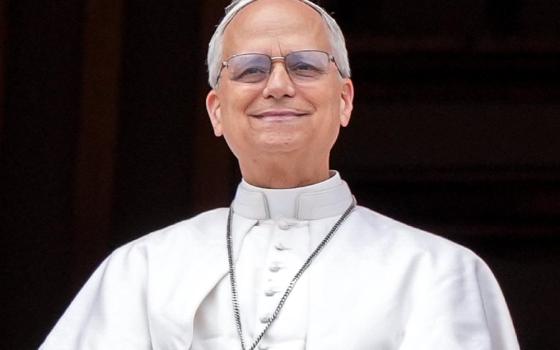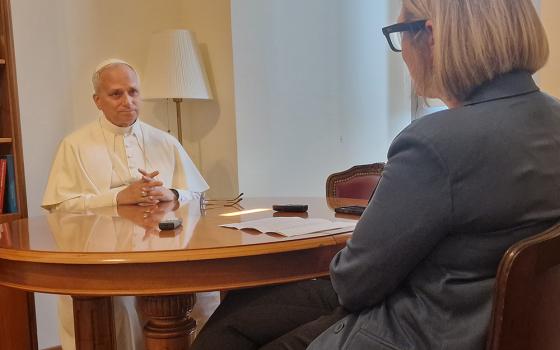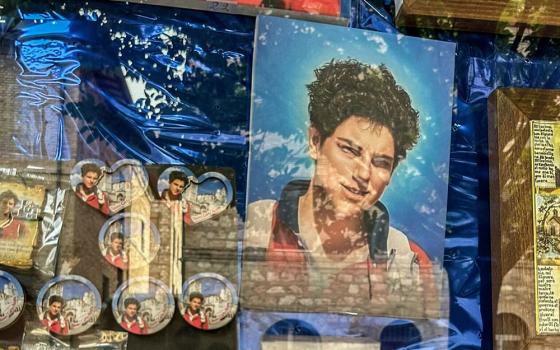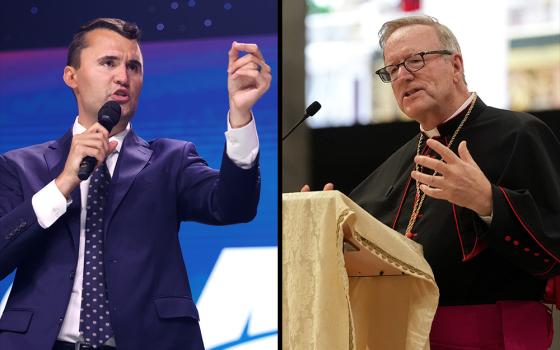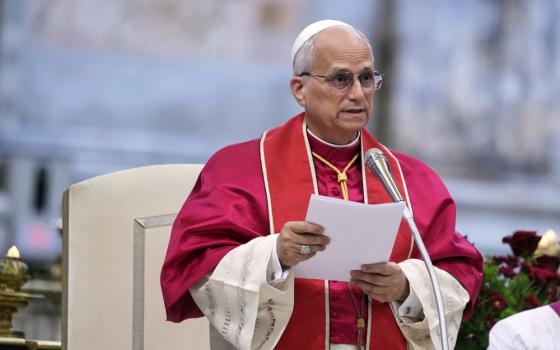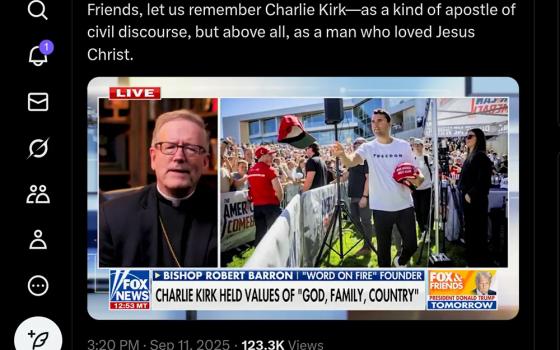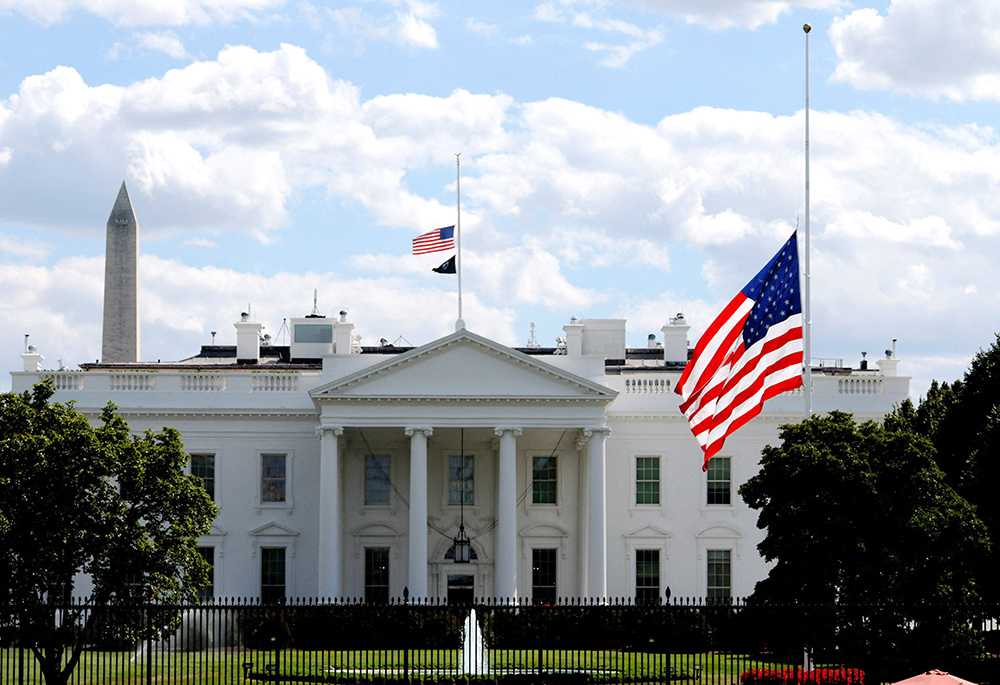
Flags at the White House in Washington fly at half staff following a deadly shooting incident in the church at Annunciation Catholic School in Minneapolis. A shooter opened fire with a rifle through the windows of the school's church and struck children celebrating Mass Aug. 27 during the first week of school, killing two and wounding 21 people in an act of violence the police chief called "absolutely incomprehensible." (OSV News/Reuters/Brian Snyder)
As a cradle Catholic and leader of Catholics Vote Common Good, I cherish the rhythms of our faith: the rosary beads sliding through my fingers, the comfort of the Mass, the beauty of prayers whispered in sorrow and joy. Prayer is powerful. It heals, sustains and unites us. But as every Catholic who has studied our tradition knows, prayer alone is not enough.
Again and again, our country is shaken by crises — gun violence in our schools, college campuses, and communities, families struggling in poverty, children without health care, immigrants living in fear, and a climate in peril. The latest gun tragedy came just this week (Sept 10) with the shocking college campus slaying of conservative firebrand Charlie Kirk.
Too often, politicians offer "thoughts and prayers" as their only response. And too often, these words are used to silence calls for meaningful change.
Some, including Vice President JD Vance and other MAGA-aligned Catholics, have suggested that prayer — and only prayer — is a sufficient Catholic response. That posture betrays both our tradition and our responsibility as citizens.
From my earliest catechism classes, I was taught the balance of ora et labora — prayer and work. Our faith is never meant to be confined to private piety. It is meant to shape public life.
Advertisement
The Letter of James could not be clearer: "If a brother or sister is naked and lacks daily food, and one of you says to them, 'Go in peace; keep warm and eat your fill,' and yet you do not supply their bodily needs, what is the good of that? So faith by itself, if it has no works, is dead" (James 2:15-17).
Catholic social teaching builds on this scriptural foundation. Gaudium et Spes, the landmark Vatican II document, teaches that "the joys and the hopes, the griefs and the anxieties of the men of this age … are the joys and hopes, the griefs and anxieties of the followers of Christ" (Paragraph 1). We cannot retreat into private prayer while ignoring systemic injustice. We must engage it.
The late Pope Francis reminded the world constantly that prayer must overflow into action. His teachings embodied the Catholic insistence that faith is lived through mercy, justice and solidarity.
Pope Leo XIV has signaled he will carry this legacy forward. In his first days as pope, he urged the church to continue Francis' commitment to service to his brothers and sisters, telling the College of Cardinals that they must "take up the precious legacy" of his predecessor. Already, his focus on the needs of the poor is shaping the direction of his pontificate.
When leaders insist that prayer is all that can or should be done, they turn a sacred practice into a shield for political inaction. This is not reverence; it is evasion.
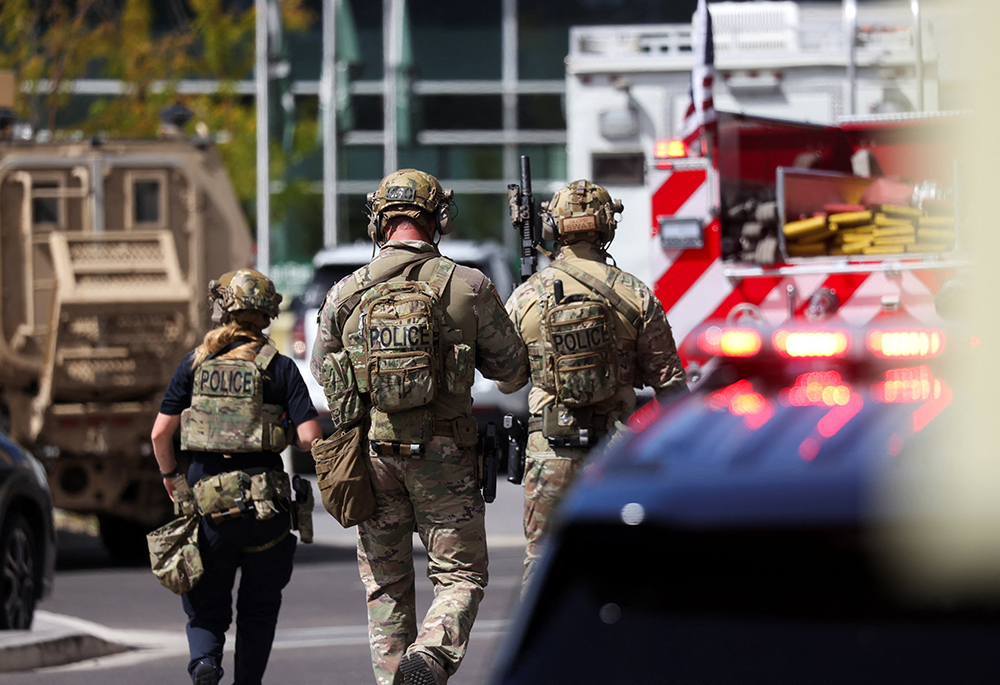
Law enforcement officers work at the crime scene at Utah Valley University where U.S. right-wing activist Charlie Kirk was shot and killed during an event in Orem Sept. 10, 2025. (OSV News/Reuters/Jim Urquhart)
Consider mass shootings. The United States has one of the highest rates of gun violence in the developed world. The Catechism of the Catholic Church teaches that public authorities are obliged to regulate "the production and sale of arms" for the sake of the common good. Yet instead of pursuing reasonable reforms — universal background checks, limits on weapons of war, investments in mental health — too many leaders hide behind "thoughts and prayers."
The same pattern emerges on poverty, immigration and climate change. We are told to pray for struggling families, for immigrants at the border, for victims of natural disasters. And indeed we must. But Catholic teaching also requires us to act:
- On poverty: Rerum Novarum (1891) insists that society must ensure fair wages, worker protections, and care for the poor.
- On immigration: the U.S. bishops' conference teaches that "people have the right to migrate to sustain their lives and the lives of their families."
- On creation: "Laudato Si', on Care for Our Common Home" (2015), one of Francis' great legacies, calls us to "hear both the cry of the earth and the cry of the poor."
When politicians offer only prayer and refuse to legislate or lead, they are not honoring the Catholic faith. They are mocking it.
As Catholics, we are called to bring our conscience to the ballot box and to public debate. Our votes and our voices are extensions of our prayer. To kneel before the altar on Sunday but remain silent in the face of injustice on Monday is a contradiction.
That is why Catholics Vote Common Good insists on linking prayer to action. We call on Catholics to vote for policies that protect children from gun violence, families from poverty, workers from exploitation, immigrants from persecution, and creation from destruction.
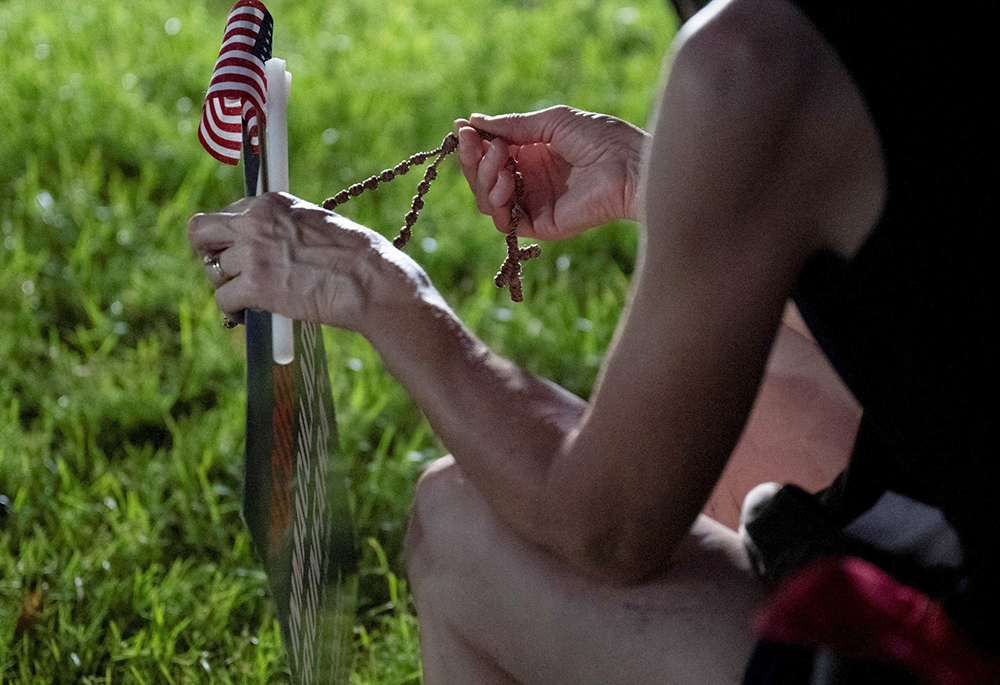
A woman holds a rosary as Catholics from across the Phoenix area gather at Desert Horizon Park in Scottsdale, Arizona, Sept.10, 2025, to pray for conservative activist Charlie Kirk, who was shot and killed that day during a Turning Point USA event at Utah Valley University in Orem. Kirk was co-founder of Turning Point USA. (OSV News/Reuters/Caitlin O'Hara)
Prayer is the beginning of this work. It grounds us and opens us to God's will. But it must never become the end of the story.
Vance and other so-called MAGA Catholics who present prayer as sufficient, portray a shallow understanding of Catholicism. Their faux outrage at anyone who dares suggest that prayer must be joined with action is disingenuous. It reduces Catholic identity to a partisan prop.
This distortion is dangerous. It teaches Catholics to equate piety with passivity, faith with inaction. It leaves the vulnerable abandoned. And it turns the richness of our tradition into a talking point for culture wars.
Common Good Catholics know better. We have lived a faith that is not only sacramental but also social — a faith that calls us to do more. We must feed the hungry, welcome the stranger and protect the innocent.
As a lifelong Catholic, I love prayer. I rely on it daily. But when children die in their classrooms, when families are torn apart by poverty, when our creation itself groans — the earth and environment entrusted to us by God — prayer alone is not enough (Romans 8:22).
Faith without works is dead. Prayer without justice is empty. Catholicism is not a call to sit still; it is a call to stand up.
Let us honor prayer not by cheapening it into a political excuse, but by living it authentically — through action for the common good.
This is what the late Pope Francis preached. This is what Pope Leo XIV is already calling us to continue. And this is what our country so desperately needs.

